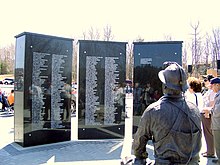| Date | April 18, 1974 (1974-04-18) 50 years ago |
|---|---|
| Location | Denison Mine, Elliot Lake |
| Coordinates | 46°29′44.15″N 082°36′00.85″W / 46.4955972°N 82.6002361°W / 46.4955972; -82.6002361 |
| Type | Wildcat strike action |
| Participants | Elliot Lake miners |
The Elliot Lake Miners Strike was a wildcat strike by approximately 1,000 uranium miners who worked at Denison uranium mine in the Elliot Lake area of Ontario, Canada. The strike was the first time that Canadian workers had taken industrial action over safety concerns, and it led to Ontario Premier Bill Davis creating a royal commission which led to the creation of new health and safety legislation.
Background
Concerned about prevalence of cancers and poor support for sick workers by mine owners, United Steelworkers representatives had been meeting with the Government of Ontario, the leader of the opposition New Democratic Party, and the Workman's Compensation Board of Ontario. At the time, the union activities were led by Gib Gilchrist, who was supported by Paul Falkowski and Homer Seguin.
Immediately prior to the strike, two representatives of United Steelworkers, attended a conference in Bordeaux, France. At the conference, they learned about a paper presented by the Ontario Ministry of Health that contained details about cancer risks to uranium miners, that had not been shared with the miners.
The strike
On 18 April 1974, the workers at Denison mine (owned by Denison Mines) started a wildcat strike that lasted fourteen days. The strike was supported by Ontario New Democratic Party leader Stephen Lewis and Member of Provincial Parliament Elie Martel.
Ed Vance, one of the striking miners, is quoted in the 2016 book Health and Safety in Canadian Workplaces:
"They deliberately kept us ignorant. There is no other way to describe it. Government has a responsibility and in this case they failed to keep the workers advised. They failed to warn the workers of their work environment. And, they were part of that conspiracy."
Effects

Mine owners immediately allowed miners to change the filters in their protective face-masks daily, an improvement from the existing weekly replacements, and soon after offered a 15 cent per hour increase in living allowance.
The government embarked on air-quality testing in the mines, but was criticized for missing some areas. Following the survey, mine owners improved underground ventilation.
Main article: Royal Commission on the Health and Safety of Workers in MinesPressure from the workers, combined with the political pressure, led to the creation of the Royal Commission on the Health and Safety of Workers in Mines, informally known as the Ham Commission after its chairperson, James Milton Ham.
The recommendations from the royal commission led to the creation of Ontario's Occupational Health and Safety Act of 1979.
See also
References
- ^ Dr Alan Hall, Professor, University of Windsor; Andrew King, United Steelworkers Union Health and Safety representative; Dr Syed Naqvi, Adjunct Professor, University of Waterloo and Occupational Health Clinics for Ontario Workers staff ergonomist; Terri Aversa, Ontario Public Service Employees Union Health and Safety representative; Nick DeCarlo, Canadian Auto Workers Union Workers‟ Compensation representative; Alec Farquhar, Managing Director, Occupational Health Clinics for Ontario Workers; Laura Lozanski, Canadian Union of University Teachers Health and Safety representative; Dr Wayne Lewchuk, Professor, McMaster University; Dr Robert Storey, Professor, McMaster University. (14 Sep 2010). "Precarious Employment and the Internal Responsibility System" (PDF). Institute for Work & Health. Labour OHCOW Academic Research Alliance.
{{cite journal}}: CS1 maint: multiple names: authors list (link) - ^ "Elliot Lake wildcat strike led to key law". thesudburystar. Retrieved 2021-12-11.
- ^ "The strike that saved lives". magazine.cim.org. Retrieved 2021-12-11.
- ^ "Workplace safety fight far from over, Steelworkers say". CBC. 17 April 2014.
- ^ MacDowell, Laurel Sefton (2012). "The Elliot Lake Uranium Miners' Battle to Gain Occupational Health and Safety Improvements, 1950–1980" (PDF). Journal of Canadian Labour Studies.
- Williams, Lynn R. (2011). One Day Longer - a memoir. University of Toronto Press. ISBN 9781442699267.
- ^ Foster, Jason; Barnetson, Bob (2016). Health and Safety in Canadian Workplaces. Athabasca University Press. pp. 81–83. doi:10.15215/aupress/9781771991834.01. ISBN 9781771991834.
| Uranium mining in Ontario | |
|---|---|
| Elliot Lake Mines | |
| Elliot Lake mines' owners | |
| Elliot Lake Mines' politics and people | |
| Bancroft Area Mines | |
| Bancroft mines' owners | |
| Bancroft mines' politics & people | |
| Organisations & events | |
| Agnew Lake | |
| Main articles | |
| History of Canada | |
|---|---|
| Year list (Timeline) | |
| Topics | |
| Provinces and territories | |
| Cities | |
| Research | |